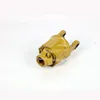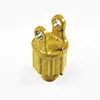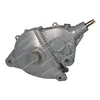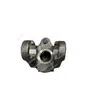Friction torque limiters and clutches are mechanical devices designed to protect machinery from overload by slipping or disengaging when torque exceeds a preset limit. They are crucial in applications where sudden jams, shocks, or overloads could damage expensive components, such as in conveyors, packaging equipment, or automotive systems. These devices ensure operational safety, reduce downtime, and extend the lifespan of machinery by acting as a mechanical fuse.
Our friction torque limiters and clutches are engineered with precision to meet diverse industrial needs. Below are the detailed specifications presented in lists and tables for clarity.
| Parameter | Range | Units | Notes |
|---|---|---|---|
| Torque Capacity | 5 to 500 | Nm | Adjustable via spring preload; customizable for higher ranges. |
| Operating Speed | Up to 3000 | RPM | Suitable for high-speed applications without loss of efficiency. |
| Temperature Range | -20 to 120 | °C | Stable performance in extreme environments. |
| Response Time | < 10 | ms | Quick disengagement to prevent damage during overloads. |
| Lifespan | > 1,000,000 | Cycles | Tested under continuous load conditions. |
These devices are versatile and used across various industries. In manufacturing, they protect robotic arms and assembly lines from jams. In automotive systems, they safeguard transmissions and powertrains. They are also common in renewable energy setups, such as wind turbines, to handle variable loads. Their adaptability makes them essential for any machinery requiring overload protection.
How do I select the right torque setting for my application?
Choose a torque setting slightly above the normal operating torque but below the damage threshold of your machinery. Consider factors like start-up torque, peak loads, and safety margins. Our products feature adjustable settings, and we provide calibration guidelines based on application specifics.
What maintenance is required for these devices?
Minimal maintenance is needed. Regularly check for wear on friction discs and ensure proper lubrication if not pre-lubricated. Inspect springs for fatigue every 6-12 months, depending on usage intensity. Most units are designed for long life with periodic visual inspections.
Can friction torque limiters be used in high-temperature environments?
Yes, our devices are rated for temperatures from -20°C to 120°C. For higher temperatures, special materials and coatings are available upon request to maintain performance and prevent degradation.
How does the response time affect machine protection?
A fast response time (under 10 milliseconds) ensures immediate disengagement during overloads, preventing damage to connected components. This is critical in high-speed or precision applications where delays could lead to costly failures.
Are these devices customizable for specific torque ranges?
Absolutely. We offer customization for torque capacities beyond standard ranges, up to several thousand Nm. Provide your application details, and we can engineer a solution with specific materials, sizes, and mounting options.
What is the difference between a torque limiter and a clutch in this context?
Torque limiters are designed primarily to slip or disengage at a set torque to protect machinery, acting as a safety device. Clutches, while similar, are often used for engaging and disengaging power transmission continuously. Our products combine both functions, offering overload protection with seamless operation.
How do I install and calibrate a friction torque limiter?
Installation involves mounting the unit securely between the drive and driven components, ensuring alignment. Calibration is done by adjusting the spring preload to the desired torque setting using a torque wrench. Detailed instructions and support are provided with each product.
Can these devices be used in reverse rotation?
Yes, most models are bidirectional and function equally well in clockwise and counterclockwise rotations. Specify your rotation direction during ordering if special designs are needed for asymmetric loads.
What industries benefit most from friction torque limiters/clutches?
Industries such as packaging, material handling, automotive, aerospace, and renewable energy benefit greatly. Any sector with machinery prone to jams, shocks, or variable loads will find these devices invaluable for reducing downtime and maintenance costs.
How do environmental factors like humidity affect performance?
Our devices are built with corrosion-resistant materials and seals to handle humid conditions. For extreme environments, optional coatings and sealed designs are available to prevent moisture ingress and ensure reliable operation.





